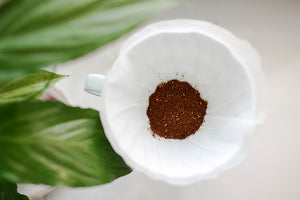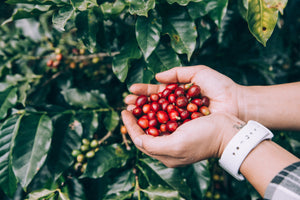
A History of London Coffee - Part 2 of 5
Let’s head back to the start of the Millennium when more people thought that all the computers were really going to stop working than were in search of a decent coffee. What did go down at the Millennium parties was the mobile phone network that simply couldn’t cope. So many spent New Year’s Eve 1999 stood few yards for friends and we didn’t know were there. Back to coffee, in the 1990s and early 2000s … the London coffee scene was exploding but it was all about the chains…with the notable exception of Monmouth who plugged away regardless, with the admirable support of importers Mercanta.
In the Midlands, the brilliant Steve Leighton started selling coffee under the name of Has Bean in 2000 and roasting properly in 2003. Nowadays he roasts coffee for a range of great cafes, for world champion baristas and for home brewing via his brilliant web site. Steve has had a hand in roasting coffees for several world champion baristas and makes regular trips to growing countries to work with farmers there. He has played a key role in educating consumers about coffee and the influence of his roasts can be tasted worldwide. He has also played a special role in developing internet based coffee sales to consumers, helping to build a market for great coffee across the wider UK.
Union Hand Roasters began roasting in 2001 with an emphasis on small scale roasting of a wide variety of beans and developed the Union direct trade method over the decade with influence from Intelligentsia, Counter Culture and other in the US as well as the sustainable trading and transparanecy promoted by the likes of Monmouth and especially green coffeee importers Mercanta (see the last part of the series). Union supply a large number of cafes and restaurants across the country. During the 2000s Jeremy Torz and Steve Macatonia shifted from a dark roasting style influenced by Alfred Peet’s desire to give customers a better deal back then to a medium roasting style designed to enhance each distinct coffee’s inherent flavour characteristics.
Without Mercanta, the London speciality coffee scene would have developed more slowly, if at all, and in 2004 they launched their sister company: the London School of Coffee whoich has played a huge role in training and development ever since.
Londinium Espresso had begun roasting in 2004. They roast to order and emphasis the local origins of their coffee. Darker roast than was to become the norm in the third wave coffee scene, Londinium also distributed and still distribute lever espresso machine. They had an influence on the early development of London specialty coffee as Hoi Chi Ng used their single origins and Scooter Caffe used their beans. More on both later.
The Third Wave – Progressive Independent Coffee in London
Aussies in Kiwis in London began to crave the cafe culture they missed from home and key places opened up.
In 2005 Sacred was started by a couple of Kiwi entrepreneurs, though to be honest, I do not remember it then. For a while it was a good to have Sacred around but their coffee soon deteriorated, especially as they switched roasters and it turned into commodity coffee served in a modern New Zealand style. The Providores and Tapa Room had been open since 2001, serving up a dash of Kiwi style in a café, restaurant, wine bar vibe. The coffee never quite seemed to cut it but they are probably due another visit as they now serve Volcano coffee.
Climpson and Sons found a home on Broadway Market in 2005 (which was not then what it is now), ever enthusiastic as they built a loyal community following. At first it was known as Burgil Coffee - they were founded by Ian Burgess, originaly from Australia. They were to rebrand as 'Climpson & Sons'. Significant coffee professionals such as Tim'Styles' Williams were to later have an impact on their cofffe. Ian Burgess went on to found London Fields Brewery. Ian is still the owner and creative director of Climpson & Sons.
In 2005 the legendary Flat White opened in Soho and everyone rejoiced. I wonder how many Londoners first heard the phrase ‘flat white’ in Berwick Street? Cam McClure had a passion to create the coffees he’d enjoyed in his native New Zealand and combined with ethical investor Peter Hall to open the café. People like James Hoffmann would drink coffee here regularly and go onto great things. Peter Dore-Smith of Kaffeine fame relates how he spend hours just watching the baristas. At first, it used Monmouth beans as most progressive cafes used then. Later places would move onto Square Mile Roasters and things would really take off. It’s sister cafe Milk Bar was to open in May 2008. But back in 2005-6 Monmouth coffee ruled.
2006 - Green shoots
In 2006 the Tolley siblings first aspired to to bring the coffeee scene they knew from Sydney, Australia to London. Winter that year saw them open the first Taylor St Baristas cafe inside a wholefood supermarket in Richmond. Somewhat humourosly, fromtoday's perspective, Andrew Tolley told me that with Flat White already having opened, they did consider whether London could really cope with two speciality coffee shops.
This was the year that Gwilym Davies left Monmouth and set up his own coffee cart in Colombia Road Flower Market in Hackney on Saturdays. He left the market that year but returned in 2007 when it began to really take off, also making coffee at Whitecross Market on weekdays. Gwilym has been a key figure on the London scene, educating customers and helping develop a scene based on co-operation, sharing, kindness and a focus on the emphasis on striving for ever better quality. In a sense Gwilym, James Hoffmann, Anette Moldvaer and the like built a London coffee scene in their own image – collaborative, humble and open-minded.
Colombia Road was the first Square Mile account. Pitch 42 at Whitecross Market (no connection with the current stall there) went on to become a proving ground for great baristas such as Jeremy Challender and Lee Harte. At this time the coffee beans of choice came were roasted by Monmouth Sadly, The beating heart of London coffee was out east, with a subsidiary beat in Soho of course.
Little known in 2006, a tall well-spoken training manager from La Spaziale UK managed to win the UK Barista Championship that year. An event that was almost unknown outside the tiny industry circle, qualifying to represent the UK in the World Barista Championships in 2007 in Tokyo. Together with Anette Moldvaer, then of Mercanta, James Hoffmann was to change London coffee forever in 2007.
Coming next – part three – The Scene was Set: 2007 WBC and the birth of Square Mile, It Builds: 2008 – Nude, Taste of Bitter Love, Lantana, Dose Espresso, Flat Cap, Electric Coffee, 2009 – The Expansion and another WBC Win.
by Phil Wain - Former Editor



